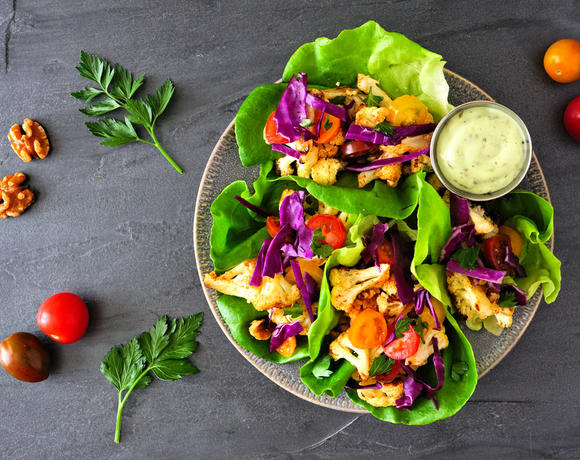Trendy diets don’t shy away from promises. From weight loss to fighting inflammation, popular diets might have you believe that they’re a cure-all. But, what you may not know is the term “anti-inflammatory” when it comes to food isn’t quite as clear cut as the diets would have you believe. Is inflammation always a bad thing that needs to be squashed with food? And if it is, what exactly does it mean to choose anti-inflammatory foods?

Inflammation Basics
The inflammatory process is not always a negative thing. This immune response is actually vital to health. It’s necessary for protecting the body from foreign invaders and plays an important role in recovery from injury and the repair of tissues. If you have a minor cut on your finger, the first thing that happens is redness, heat, and swelling. That response is the immune system at work as a part of the process to repair the injury. However, when the immune system is chronically reacting whether due to pathogens, wounds, or sometimes for unknown reasons, the inflammatory response can remain active for a long period of time, sometimes years, that can lead to chronic, systemic inflammation with lasting effects. It’s this process that is correlated with chronic diseases such as heart disease, diabetes, and cancer.
Can Foods be Anti-Inflammatory?
The focus on the diet and inflammatory response connection is not new. The ancient practice of Ayurveda often involves using traditional therapies to reduce inflammation and ultimately treat chronic disease and today, many Americans turn to supplements that promise anti-inflammatory action which is evident in the growing industry that now reaches over $10 billion per year. Even though supplements and single foods may be perceived as the simple way to reduce or prevent chronic inflammation, research shows that diet patterns may have more of an influence.
Many studies have made connection between diet and chronic disease. Large, population studies such as the Nurses’ Health Study and the Framingham Heart Study point to a connection between diet patterns, inflammation, and chronic disease risk. Some small studies have shown that a shift in diet quality with changes such as reducing added sugar and increasing unsaturated fats results in a reduction of inflammatory blood markers. However, much of the research in humans draws correlations between diet patterns, not necessarily specific foods, with seemingly anti-inflammatory properties and chronic disease outcomes. The best thing we can do today is focus on eating patterns that support our health and helps us maintain a healthy immune system versus depending on individual foods to provide anti-inflammatory effects.
Anti-Inflammatory Diet Patterns
Many diets tout anti-inflammatory properties. Some take an extreme approach by eliminating so called inflammatory foods while others focus on foods to add to the diet that may aid in preventing inflammation. At this point, there isn’t a consensus on a specific dietary pattern that constitutes an anti-inflammatory diet, but there are common themes:
- A diet rich in fruits and vegetables
- Consuming the majority dietary fat from unsaturated sources such as those found in seafood, nuts, seeds, and plant oils versus saturated sources
- Choosing whole grains instead of processed grains most of the time
- Choosing proteins from a variety of sources, including plant-based sources
- Limiting processed meat intake
- Limiting added sugar intake
- Limiting alcohol intake
This list may look familiar as it consists of recommendations many health institutions and governing bodies have made for years – and for good reason. Following this type of diet pattern is one of the best ways to support your health while also helping to prevent chronic inflammatory processes from continuing. Instead of singling out specific foods for their inflammatory properties, consider those foods as one piece in a bigger puzzle that works together.
Everyday Swaps
Before you begin to feel overwhelmed by where to start when it comes to introducing foods into your diet to build a healthy eating pattern, try starting with simple, everyday swaps to foods you already eat. For example, if you’re one to put butter on toast every day, can you swap the butter with peanut butter or almond butter one or two days a week? And while you’re at it, how about swapping the refined grain bread for a whole grain bread? These types of everyday swaps can go a long way in shifting a diet pattern.
Try these swaps:
- Swap sugar-sweetened soda or tea with an unsweetened beverage like water with herbs or lemon tea.
- Swap cheese on a sandwich with avocado or hummus.
- Swap coconut oil or butter with olive oil or avocado oil.
- Swap chips as a snack with roasted edamame or almonds.
- Try blending beans into meat for burgers or chili.
- Add vegetable purees to sauces.
Share your everyday swaps with us on Instagram with #weeatlivedowell.
Related:
Trending Diets // Supporting a Healthy Immune System // Planetary Health Diet



Thanks for pointing out that there are options that would have anti-inflammatory properties that can aid a person by following a certain dietary pattern. With that in mind, it would help if I book an anti-inflammatory meal service for my dad. It’s because he has had issues with his knees ever since he reached the age of 50.